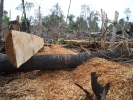- Details
 A group of Indonesian NGOs released today a report that brings to light the obscure structure of Asia Pulp & Paper (APP), one of the major paper producers in the world. This structure has been used by APP to deny its responsibility in a case of deforestation recently raised by Greenpeace, that led the organisation to stop the engagement with the company.
A group of Indonesian NGOs released today a report that brings to light the obscure structure of Asia Pulp & Paper (APP), one of the major paper producers in the world. This structure has been used by APP to deny its responsibility in a case of deforestation recently raised by Greenpeace, that led the organisation to stop the engagement with the company.
- Details
 The people of Estonia struggling to prevent a huge ‘biorefinery’, which would consume a quarter of Estonia’s wood supply and pollute the country’s second largest river, have today received support from concerned organisations all over the world. Estonian civil society groups, the City of Tartu, the former prime minister and many prominent scientists have already made public statements of their opposition and tomorrow, thousands of Estonians will take to the streets to protest the proposed Est-For pulp mill and energy plant and demand that the government show it a red light. Today, the Environmental Paper Network (EPN) is releasing a discussion document: "Bio-refinery: new name, dirty old story" detailing the concerns of civil society, scientists and politicians about the proposed ‘Est-For’ pulp mill and energy plant.
The people of Estonia struggling to prevent a huge ‘biorefinery’, which would consume a quarter of Estonia’s wood supply and pollute the country’s second largest river, have today received support from concerned organisations all over the world. Estonian civil society groups, the City of Tartu, the former prime minister and many prominent scientists have already made public statements of their opposition and tomorrow, thousands of Estonians will take to the streets to protest the proposed Est-For pulp mill and energy plant and demand that the government show it a red light. Today, the Environmental Paper Network (EPN) is releasing a discussion document: "Bio-refinery: new name, dirty old story" detailing the concerns of civil society, scientists and politicians about the proposed ‘Est-For’ pulp mill and energy plant. - Details
 Asia Pulp and Paper (APP), Indonesia’s largest pulp and paper company, is still linked to forest destruction, according to new mapping analysis completed by Greenpeace International. Almost 8,000 hectares of forest and peatland has been cleared since 2013 in two concessions which are linked to APP and its parent company the Sinar Mas Group. Greenpeace International put these allegations to APP / Sinar Mass, and the group failed to provide a credible response or to take meaningful action. As a result, Greenpeace has ended all further engagement with APP/Sinar Mas.
Asia Pulp and Paper (APP), Indonesia’s largest pulp and paper company, is still linked to forest destruction, according to new mapping analysis completed by Greenpeace International. Almost 8,000 hectares of forest and peatland has been cleared since 2013 in two concessions which are linked to APP and its parent company the Sinar Mas Group. Greenpeace International put these allegations to APP / Sinar Mass, and the group failed to provide a credible response or to take meaningful action. As a result, Greenpeace has ended all further engagement with APP/Sinar Mas.
- Details
 A Portuguese pulp company wants to clear up to 237,000 hectares – including Mozambique’s miombo woodlands, a unique southern African ecosystem – for eucalyptus plantations. Rural people are being driven into poverty as Portucel grabs their land. Please, support the petition to stop deforestation and land-grabbing!
A Portuguese pulp company wants to clear up to 237,000 hectares – including Mozambique’s miombo woodlands, a unique southern African ecosystem – for eucalyptus plantations. Rural people are being driven into poverty as Portucel grabs their land. Please, support the petition to stop deforestation and land-grabbing!
- Details
 It is happening now. The Indian Ministry of Environment, Forest and Climate Change published a Draft National Forest Policy that, if approved, it will open up the public land to the corporate sector, to develop tree plantations on government-owned forest lands. So far, this is explicitly banned under the existing National Forest Policy, to to protect forest dwellers. Now, not anymore. The previous (still exising) law stated that "Natural forests serve as a gene pool resource and help to maintain ecological balance. Such forests will not, therefore, be made available to industries for undertaking plantation and for any other activities.” Now it seems that the forests will be sold out to expand industrial plantations.
It is happening now. The Indian Ministry of Environment, Forest and Climate Change published a Draft National Forest Policy that, if approved, it will open up the public land to the corporate sector, to develop tree plantations on government-owned forest lands. So far, this is explicitly banned under the existing National Forest Policy, to to protect forest dwellers. Now, not anymore. The previous (still exising) law stated that "Natural forests serve as a gene pool resource and help to maintain ecological balance. Such forests will not, therefore, be made available to industries for undertaking plantation and for any other activities.” Now it seems that the forests will be sold out to expand industrial plantations.


